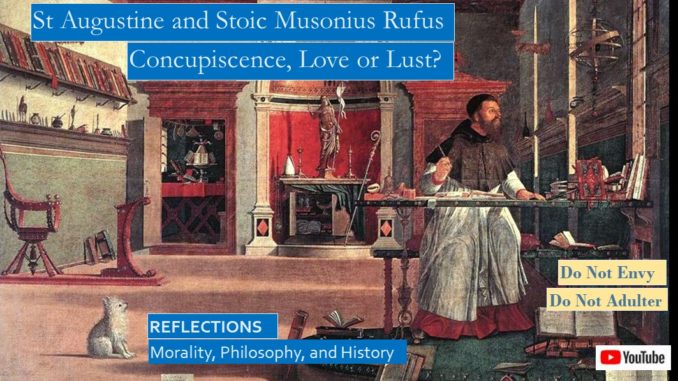
Many who denigrate St Augustine for his overly strict attitudes on intimacy and concupiscence do not realize that he was repeating what Stoic philosophers taught. Rufus is our best example, he criticizes “men who live luxuriously and desire a variety of sexual experiences, legitimate and illegitimate, with both women and men.” Then Rufus gives us advice that is very similar to the teachings of St Augustine: “men who are neither licentious nor wicked must consider only those intimate acts between husband and wife for the creation of children to be right and lawful, but intimate acts that chase after mere pleasure, even in marriage, to be wrong and unlawful.” What if nobody is hurt by these acts of pleasure? Rufus maintains “everyone who acts wrongly and unjustly, even if doesn’t hurt those near to him, immediately shows himself to be entirely base and dishonorable.”[1]
See related blogs: St Augustine on Concupiscence
http://www.seekingvirtueandwisdom.com/st-augustine-on-concupiscence-blog-1/
http://www.seekingvirtueandwisdom.com/st-augustine-on-concupiscence-blog-2/
http://www.seekingvirtueandwisdom.com/st-augustine-on-concupiscence-blog-3-final-reflections/
YouTube video, St Augustine, Stoic Musonius Rufus, & Ruth on Concupiscence: Love or Lust? Controlling the Passions: https://youtu.be/-wv6bVeG74A
What Rufus and St Augustine are saying to us is simply we should not use another person SOLELY for our own pleasure. We in the modern world should feel blessed that modern medicine ensures that our wives are not risking their lives every time they bear our children. This advice would not sound so draconian if we were living in ancient times. Please compare this blog to my blog on St Augustine and concupiscence.
Rufus sounds more like St Paul in his next lecture on marriage, where he says that the purpose of marriage is children, and that they should “consider all things as common possession and nothing as private, not even the body itself.” Although children are important to marriage, there must also be “companionship and care of husband and wife for each other, both in sickness and in health and on every occasion.” The Church teaches that marriage is a monastic calling, and Rufus agrees, saying that “when this mutual care is complete, each spouse competes to surpass the other in giving such care. Such a marriage is admirable and deserves emulation, such a partnership is beautiful.” But when one or both spouses are selfish rather than selfless, when they neglect the concerns of their spouse, “they either break apart completely from each other, or their marriage is worse than solitude.” “Souls that are naturally disposed towards self-control and justice, in a word, virtue, they are obviously most suitable for marriage.”[2]
CONTROLLING THE APPETITE
Rufus agreed with the early Church Fathers, their monastic rules constantly stress the spiritual benefits that flow from controlling your appetites and denying the belly. Rufus remembers how Socrates said that while most men live to eat, he eats to live. Likewise, “gluttony is nothing other than lack of self-control with respect to food, and people prefer pleasant-tasting food to nutritious food.” “Mastering one’s appetites for food and drink is the beginning and basis of self-control.” Rufus prefers foods that you can eat without cooking, fruits, vegetables, milk, cheese, and honeycombs, and he prefers simple food over gourmet meals and sweets. “A meat-based diet is too crude for humans and is more suitable for wild beasts.”[3]
Similarly, the early Church Fathers encourage fasting from meat on Wednesday and Fridays, and during Lent and many of the other fast weeks in the Church calendar. Many people mistakenly think fasting means abstaining from food completely for a long period of time, and that is not the teaching of the Church. Fasting means eating in moderation, eating only what is necessary, and abstaining from certain foods according to the church calendar. Those who are old or sick or have medical conditions that would be aggravated by fasting are not encouraged to fast if it would damage their health.
PRACTICING PHILOSOPHY
The early Church Fathers in the Philokalia teach us that living a godly life is living a life of discipline and self-control, fasting and prayer. Likewise, Rufus tells us that “the man who wants to live a godly life must not only learn the lessons which pertain to virtue but train himself to follow them eagerly and rigorously.” The philosopher has to train both his soul and his body by enduring hardships and not giving into pleasures but instead we should “accustom ourselves to cold, heat, thirst, hunger, scarcity of food, hardness of bed, abstaining from pleasures, and enduing pains.” “The person who is practicing to become a philosopher must seek to overcome himself so we won’t welcome pleasure and avoid pain, so that he won’t love living and fear death, and in the case of money, he won’t honor receiving over giving.” “The man who wants to be good must not only learn the lessons which pertain to virtue but also train himself to follow them eagerly and rigorously.” [4]
In addition to his Lectures, we have a small collection of Sayings attributed to Musonius Rufus, which include:
“Speak of shameful things, and you will lose your reluctance to do them.”
“If you work hard to do what is right, do not be upset by roadblocks.”
“You will deserve respect from everyone if you start by respecting yourself.” This is a different and healthier emphasis from a saying we hear far too often, which we never hear from the Stoics, you cannot love others until you love yourself. This is counter to Stoic philosophy.
“Don’t expect to tell others what they should do when they know that you do what you shouldn’t.” This is particularly good advice for parents, and a good reason for parents to strive to set a good example for their children, for children do as you do, they do not do as you say.
“Only the man who learns to want nothing in every circumstance is truly wealthy.”[5]
[1] Musonius Rufus, translated by Cynthia King (published by www.CreateSpace.com, 2011), from Lectures, Book 12, pp. 55-56
[2] Musonius Rufus, Lectures, Book 13, pp. 57-58
[3] Musonius Rufus, Lectures, Book 18, pp. 72-76.
[4] Musonius Rufus, Lectures, Book 6, pp. 36-37.
[5] Musonius Rufus, Sayings, pp. 85-86.


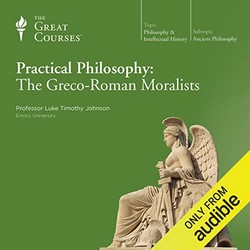
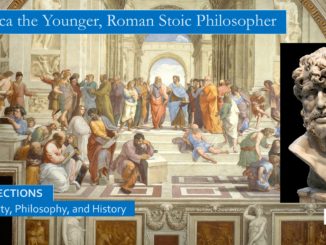
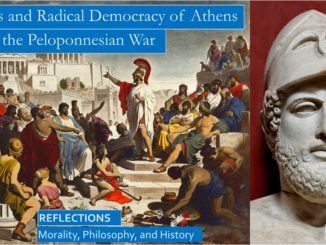
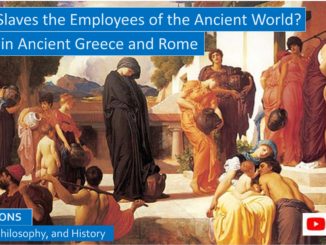
5 Trackbacks / Pingbacks